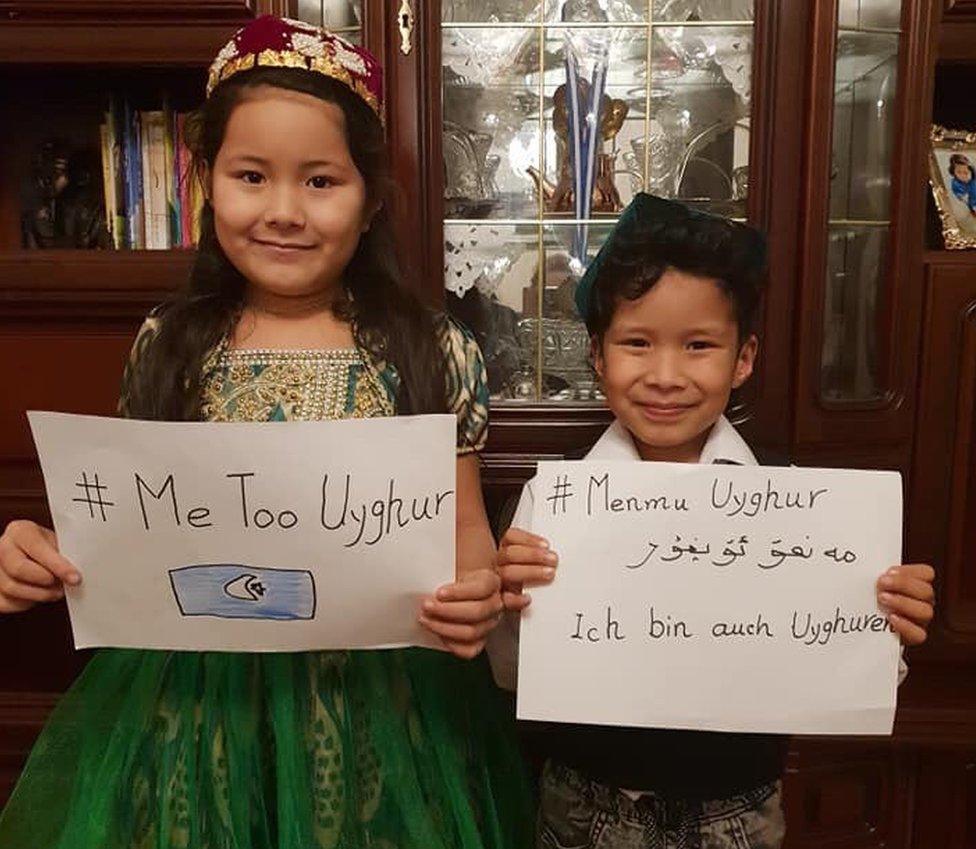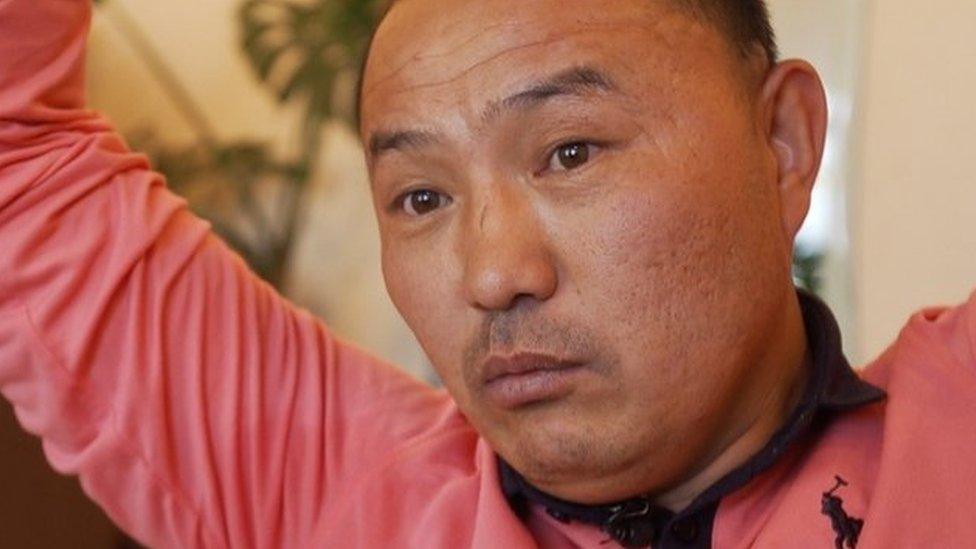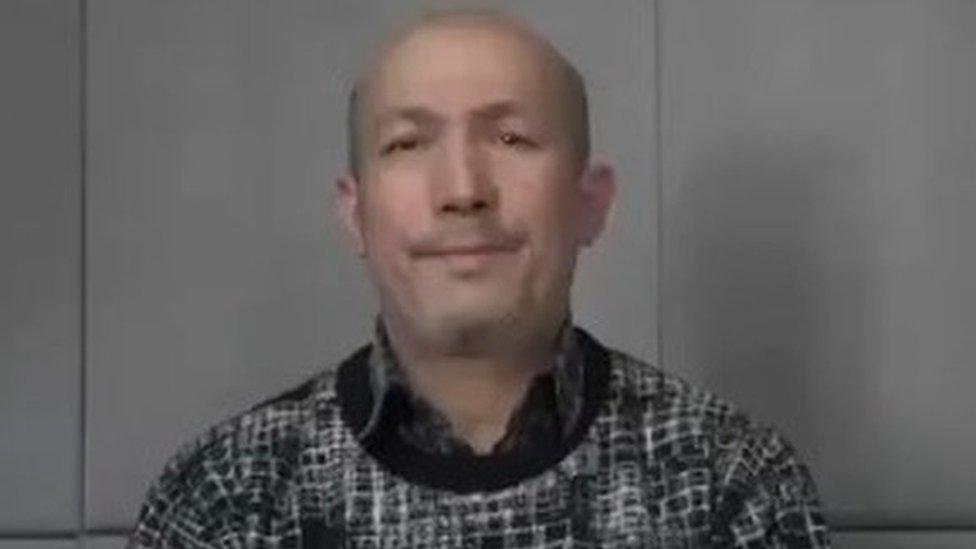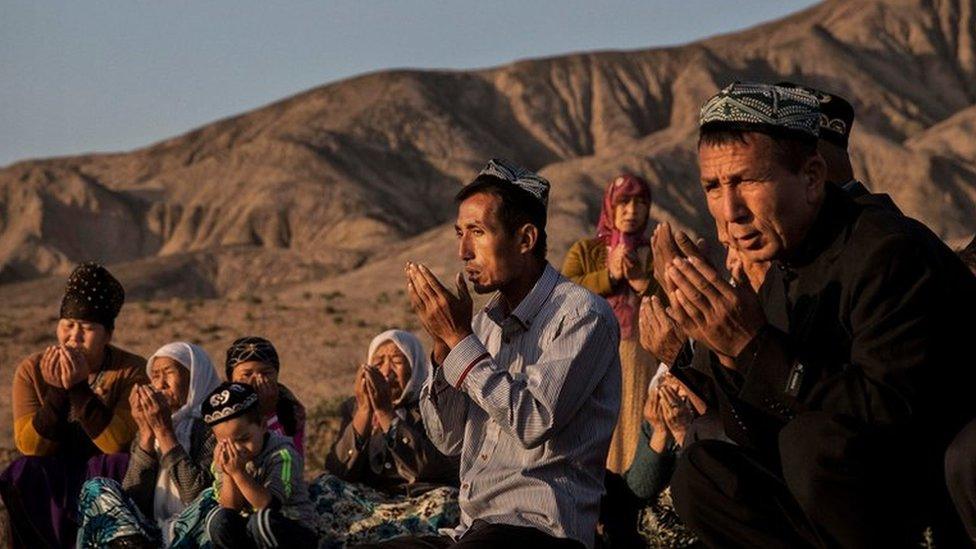Uighurs ask China: 'Show me my mother and father are alive'
- Published

Uighurs are coming out in support for those missing in camps
Since Chinese state media released a video appearing to show a prominent Uighur musician alive, despite reports of his death, Uighur Muslims have flooded social media with requests for news of their missing relatives.
On 10 February, the footage released showed a man said to be Abdurehim Heyit stating he was in "good health". The video came after Turkey criticised China's mass detention of Uighurs in its far west, saying it had learned of Mr Heyit's death in a camp.
Questions about the video's authenticity and when it was filmed were raised by some Uighur groups. Now, using the hashtag #MeTooUyghur, relatives of detainees and activists have taken to Twitter and Facebook to ask the Chinese government to prove that their loved ones are still alive.
Up to a million Uighurs and other Muslims are believed to have been detained in detention centres that China says are for vocational training and necessary to fight terrorism.
Are they alive?
Alfred tweeted he'd not seen his parents for more than 11 months and wanted China to "show me they are still alive".
Allow X content?
This article contains content provided by X. We ask for your permission before anything is loaded, as they may be using cookies and other technologies. You may want to read X’s cookie policy, external and privacy policy, external before accepting. To view this content choose ‘accept and continue’.

Uighurs in China's far-western Xinjiang region have come under intense surveillance by the Chinese authorities. Many Uighurs who live outside of China say they haven't spoken to their family members in years.
Babur Jalalidin and his sister, also worried about the wellbeing of their parents, detained since January 2018, also asked China to provide proof of life, external.
The son of the former editor-in-chief of the official Xinjiang Cultural Journal, Qurban Mamut, appealed for the release of his father, who has been missing since 2017.
"Show my father Kurban Mamut's video too. You've cut our connection for more than a year," Bahram Qurban tweeted.
Allow X content?
This article contains content provided by X. We ask for your permission before anything is loaded, as they may be using cookies and other technologies. You may want to read X’s cookie policy, external and privacy policy, external before accepting. To view this content choose ‘accept and continue’.

The cousin of 25-year-old professional football player Erpat Ablekrem appealed on Facebook to the Chinese government to free him from "the concentration camp" where, he says, he has been detained since March 2018.
Allow Facebook content?
This article contains content provided by Facebook. We ask for your permission before anything is loaded, as they may be using cookies and other technologies. You may want to read Meta’s Facebook cookie policy, external and privacy policy, external before accepting. To view this content choose ‘accept and continue’.

In Finland, Uighur activist Halmurat Harri asked about the many others who remain missing.
Allow X content?
This article contains content provided by X. We ask for your permission before anything is loaded, as they may be using cookies and other technologies. You may want to read X’s cookie policy, external and privacy policy, external before accepting. To view this content choose ‘accept and continue’.
Why was the video released?
Over the weekend Turkey's foreign ministry issued a statement in response to reports of the death of Abdurehim Heyit, external. It said detained Uighurs were being subjected to "torture", branded China's policy towards them a "great shame for humanity" and called for the "concentration camps" to be shut down.
China hit back on 11 February, calling Turkey's statement "absurd lies" and "contrary to the facts".
In August 2018, the UN Committee on the Elimination of Racial Discrimination heard that there were credible reports that China was holding a million Uighurs in "counter-extremism centres".
International rights organisations say that Uighurs are held in these internment camps against their will and are not allowed to contact their family members.
China has repeatedly denied the allegations, describing the camps as "vocational training centres".

You might also like:
- Published12 February 2019

- Published11 February 2019

- Published8 November 2018
